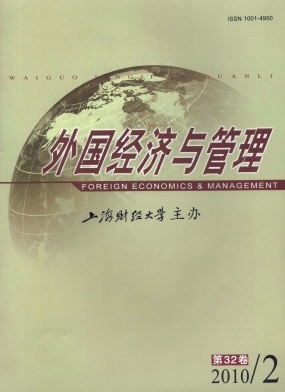组织分析中的制度创业研究述评
外国经济与管理 2010 年 第 32 卷第 02 期, 页码:16 - 23
摘要
参考文献
摘要
"制度创业"是组织新制度学派在研究制度变迁时使用的一个概念。制度创业研究丰富了学术界对制度创业这一特定制度变迁形式的认识,也为管理学界目前正在升温的创业研究贡献了一个崭新的主题。本文循着组织新制度学派的制度创业研究总体进路,回顾了该学派在制度创业动因、制度创业者和制度创业过程研究方面取得的主要成果,并指出了该学派的制度创业研究在研究假设、方法和视域以及与其他学科或学派的对话与交流等方面存在的不足。
[1]Maguire,S,Hardy,C,and Lawrence,T B.Institutional entrepreneurshipin emerging fields:HI V/AIDStreat ment advocacyin Canada[J].Academy of Management Journal,2004,47(5):657-679.
[2]Di Maggio,Paul J.Interest and agency ininstitutional theory[A].in L G Zucker(Ed.).Institutional patterns and organizations:Cul-ture and environment[C].Cambridge,MA:Ballinger,1988:3-21.
[3]Di Maggio,Paul J,and Powell,Walter W.Introduction[A].in Walter WPowell,and Paul J Di Maggio(Eds.).The newinstitutionalismin organization analysis[C].Chicago:University of Chicago Press,1991:1-38.
[4]W.沃尔特.鲍威尔,保罗.迪马吉奥.中文版序言[A].载[美]沃尔特.鲍威尔,保罗.迪马吉奥.组织分析中的新制度主义[C].(姚伟译).上海:上海人民出版社,2008:1-5.
[5]Seo,M,and Creed,WE.Institutional contradictions,praxis andinstitutional change:Adialectical perspective[J].Academy of Manage-ment Review,2002,27(2):222-247.
[6]Zilber,T B.Institutionalization as aninterplay between actions,meanings and actors:The case of a rape crisis center in Israel[J].A-cademy of Management Journal,2002,45(1):234-254.
[7]Greenwood,R,Suddaby,R,and Hinings,C R.Theorizing change:The role of professional associationsinthe transformation of institu-tionalized fields[J].Academy of Management Journal,2002,45(1):58-80.
[8]Zucker,Lynne G.Organizations asinstitutions[A].in SamBacharach(Ed.).Researchinthe sociology of organizations[C].Greenwich,CN:JAI Press,1983:1-47.
[9]Fligstein,N.Social skill andinstitutional theory[J].American Behavioral Scientist,1997,40(4):397-405.
[10]Tolbert,P S,and Zucker,L G.Institutionalization of institutional theory[A].in Clegg Chard S,and WNord(Eds.).Handbook of or-ganizational studies[C].London:Sage Publications,1996:175-190.
[11]Phillips,N,Lawrence,T B,and Hardy,C.Inter-organizational collaboration and the dynamics of institutional fields[J].Journal ofManagement Studies,2000,37(1):23-44.
[12]Beckert,J.Agency,entrepreneurs,andinstitutional change:The role of strategic choice andinstitutionalized practicesin organizations[J].Organization Studies,1999,20(5):777-799.
[13]Dorado,S.Institutional entrepreneurship,partaking,and convening[J].Organization Studies,2005,26(3):383-414.
[14]Greenwood,R,and Hinings,C R.Understanding radical organizational change:Bringingtogether the old andthe newinstitutionalism[J].Academy of Management Review,1996,21(4):1 022-1 054.
[15]Hardy,C,and Maguire,S.Institutional entrepreneurship[A].in Greenwood,R,Suddaby,R,Oliver,C,and K Shalin-Andersson(Eds.).The Sage handbook of organizational institutionalism[C].London:Sage Publications,2008:198-217.
[16]Mutch,A.Reflexivity and theinstitutional entrepreneur:Ahistorical explanation[J].Organization Studies,2007,28(7):1 123-1 140.
[17]Fligstein,N.Social skills and the theory of fields[J].Sociological Theory,2001,19(2):105-125.
[18]Battilana,J.Agency andinstitutions:The enabling role of individuals’social position[J].Organization,2006,13(5):653-676.
[19]Greenwood,R,and Suddaby,R.Institutional entrepreneurship in mature fields:The big five accounting firms[J].Academy ofManagement Journal,2006,49(1):27-48.
①国内有学者把“institutional entrepreneurship”译为“制度创新”,如李新春、何轩、陈文婷等;也有人把它译成“制度变革”和“制度创业者精神”;但更多的学者把它译作“制度创业”,如张玉利、薛红志、杨俊、曾楚宏、朱仁宏、李青、潘锦臻等。从组织新制度学派对“institu-tional entrepreneurship”的定义来看,笔者觉得应把它译为“制度创业”。相应地,本文把“institutional entrepreneur”译为“制度创业者”。
②组织新制度主义(或组织分析的新制度主义)是一个歧义很大的概念,这首先表现为学者们对新制度主义看法不一。Di Maggio和Powell认为,事实上存在不同学科背景的新制度主义———新制度经济学或经济学新制度主义、政治学新制度主义(包括政治学的制度实证理论和国际体制理论)和社会学新制度主义。[3]令人困惑的是,他们俩并没有把组织分析新制度主义(或组织理论新制度主义)归入社会学新制度主义,而是认为前者更具社会学色彩,且在文中与后者并列使用。而豪尔和泰勒(豪尔和罗斯玛丽,2003)则根据不同的思想流派把新制度主义划分为历史制度主义、理性选择制度主义和社会学制度主义。此外,“新制度主义”对于组织新制度学派来说也是一个颇有争议的术语。譬如,斯格特就只使用“制度主义”,而Di Maggio和Powell则使用“新制度主义”(邱泽奇,1999)。至于组织新制度主义到底属于哪个社会学分支,学者们的观点也各不相同。倪志伟(2009)把组织新制度主义与新经济社会学和新制度经济学并列,认为它们不存在隶属关系。周雪光(2003)把组织新制度主义视为组织社会学的一个分支学派以与社会网络学派(实际上是经济社会学)对应。而高柏(2008)则在《当代经济社会学丛书》的“代总序”中指出,组织制度学派(即组织新制度主义)与历史制度学派是经济社会学的两个分支。本文认为,组织新制度主义(或组织新制度学派)虽然起源于由约翰.迈耶、布莱恩.罗恩、理查德.斯格特和林恩.朱克尔等最初提出的主张(参见本文参考文献[4]),但现在已经不再局限于他们的最初主张,因为它的知识成果包含越来越多的管理学者甚至经济学者的贡献。本文同时使用“组织新制度主义”、“组织分析新制度主义”、“组织新制度理论”和“组织新制度学派”。
[2]Di Maggio,Paul J.Interest and agency ininstitutional theory[A].in L G Zucker(Ed.).Institutional patterns and organizations:Cul-ture and environment[C].Cambridge,MA:Ballinger,1988:3-21.
[3]Di Maggio,Paul J,and Powell,Walter W.Introduction[A].in Walter WPowell,and Paul J Di Maggio(Eds.).The newinstitutionalismin organization analysis[C].Chicago:University of Chicago Press,1991:1-38.
[4]W.沃尔特.鲍威尔,保罗.迪马吉奥.中文版序言[A].载[美]沃尔特.鲍威尔,保罗.迪马吉奥.组织分析中的新制度主义[C].(姚伟译).上海:上海人民出版社,2008:1-5.
[5]Seo,M,and Creed,WE.Institutional contradictions,praxis andinstitutional change:Adialectical perspective[J].Academy of Manage-ment Review,2002,27(2):222-247.
[6]Zilber,T B.Institutionalization as aninterplay between actions,meanings and actors:The case of a rape crisis center in Israel[J].A-cademy of Management Journal,2002,45(1):234-254.
[7]Greenwood,R,Suddaby,R,and Hinings,C R.Theorizing change:The role of professional associationsinthe transformation of institu-tionalized fields[J].Academy of Management Journal,2002,45(1):58-80.
[8]Zucker,Lynne G.Organizations asinstitutions[A].in SamBacharach(Ed.).Researchinthe sociology of organizations[C].Greenwich,CN:JAI Press,1983:1-47.
[9]Fligstein,N.Social skill andinstitutional theory[J].American Behavioral Scientist,1997,40(4):397-405.
[10]Tolbert,P S,and Zucker,L G.Institutionalization of institutional theory[A].in Clegg Chard S,and WNord(Eds.).Handbook of or-ganizational studies[C].London:Sage Publications,1996:175-190.
[11]Phillips,N,Lawrence,T B,and Hardy,C.Inter-organizational collaboration and the dynamics of institutional fields[J].Journal ofManagement Studies,2000,37(1):23-44.
[12]Beckert,J.Agency,entrepreneurs,andinstitutional change:The role of strategic choice andinstitutionalized practicesin organizations[J].Organization Studies,1999,20(5):777-799.
[13]Dorado,S.Institutional entrepreneurship,partaking,and convening[J].Organization Studies,2005,26(3):383-414.
[14]Greenwood,R,and Hinings,C R.Understanding radical organizational change:Bringingtogether the old andthe newinstitutionalism[J].Academy of Management Review,1996,21(4):1 022-1 054.
[15]Hardy,C,and Maguire,S.Institutional entrepreneurship[A].in Greenwood,R,Suddaby,R,Oliver,C,and K Shalin-Andersson(Eds.).The Sage handbook of organizational institutionalism[C].London:Sage Publications,2008:198-217.
[16]Mutch,A.Reflexivity and theinstitutional entrepreneur:Ahistorical explanation[J].Organization Studies,2007,28(7):1 123-1 140.
[17]Fligstein,N.Social skills and the theory of fields[J].Sociological Theory,2001,19(2):105-125.
[18]Battilana,J.Agency andinstitutions:The enabling role of individuals’social position[J].Organization,2006,13(5):653-676.
[19]Greenwood,R,and Suddaby,R.Institutional entrepreneurship in mature fields:The big five accounting firms[J].Academy ofManagement Journal,2006,49(1):27-48.
①国内有学者把“institutional entrepreneurship”译为“制度创新”,如李新春、何轩、陈文婷等;也有人把它译成“制度变革”和“制度创业者精神”;但更多的学者把它译作“制度创业”,如张玉利、薛红志、杨俊、曾楚宏、朱仁宏、李青、潘锦臻等。从组织新制度学派对“institu-tional entrepreneurship”的定义来看,笔者觉得应把它译为“制度创业”。相应地,本文把“institutional entrepreneur”译为“制度创业者”。
②组织新制度主义(或组织分析的新制度主义)是一个歧义很大的概念,这首先表现为学者们对新制度主义看法不一。Di Maggio和Powell认为,事实上存在不同学科背景的新制度主义———新制度经济学或经济学新制度主义、政治学新制度主义(包括政治学的制度实证理论和国际体制理论)和社会学新制度主义。[3]令人困惑的是,他们俩并没有把组织分析新制度主义(或组织理论新制度主义)归入社会学新制度主义,而是认为前者更具社会学色彩,且在文中与后者并列使用。而豪尔和泰勒(豪尔和罗斯玛丽,2003)则根据不同的思想流派把新制度主义划分为历史制度主义、理性选择制度主义和社会学制度主义。此外,“新制度主义”对于组织新制度学派来说也是一个颇有争议的术语。譬如,斯格特就只使用“制度主义”,而Di Maggio和Powell则使用“新制度主义”(邱泽奇,1999)。至于组织新制度主义到底属于哪个社会学分支,学者们的观点也各不相同。倪志伟(2009)把组织新制度主义与新经济社会学和新制度经济学并列,认为它们不存在隶属关系。周雪光(2003)把组织新制度主义视为组织社会学的一个分支学派以与社会网络学派(实际上是经济社会学)对应。而高柏(2008)则在《当代经济社会学丛书》的“代总序”中指出,组织制度学派(即组织新制度主义)与历史制度学派是经济社会学的两个分支。本文认为,组织新制度主义(或组织新制度学派)虽然起源于由约翰.迈耶、布莱恩.罗恩、理查德.斯格特和林恩.朱克尔等最初提出的主张(参见本文参考文献[4]),但现在已经不再局限于他们的最初主张,因为它的知识成果包含越来越多的管理学者甚至经济学者的贡献。本文同时使用“组织新制度主义”、“组织分析新制度主义”、“组织新制度理论”和“组织新制度学派”。
引用本文
张铭, 胡祖光. 组织分析中的制度创业研究述评[J]. 外国经济与管理, 2010, 32(2): 16–23.
导出参考文献,格式为:





 7277
7277  278
278

